Setting Up Business In Vietnam [New 2024]
- 27/12/2023
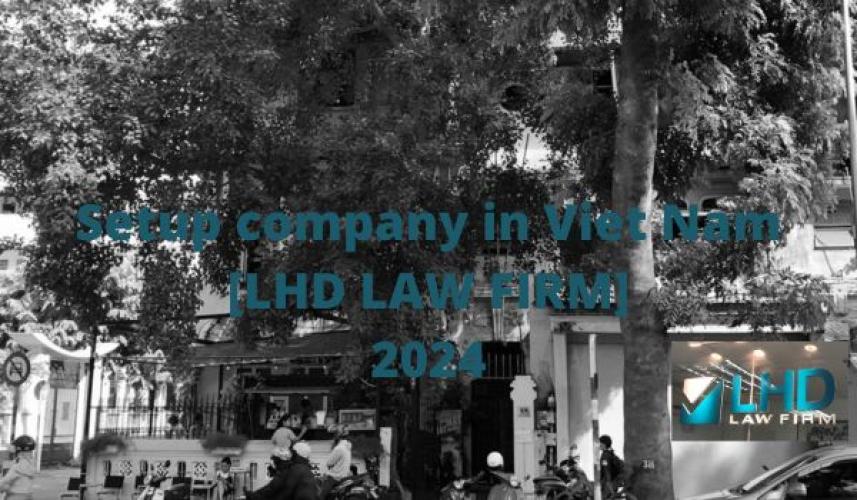
↗️ Order Now! Formation Your Company in Vietnam [Virtual Office Space, Set-up company, Tax Advice, Legal Advice) full Services in Vietnam] 🔻
 CONTENT
CONTENT
 CONTENT
CONTENT
Set up company in Vietnam [New 2024]
Setting up a business in Vietnam in 2024 requires attention to changes in investment and business laws. At the same time, the economic recession context also forces investors to consider promising business areas.
Although Vietnam is a very attractive investment destination for foreign investors, establishing a company still requires complex legal procedures. This section describes the procedures for establishing a company that wants to start operations in the country.
Prospects for establishing a company in Vietnam
According to data from the Ministry of Planning & Investment, as of September 20, 2023, the total FDI capital registered in Vietnam includes new registered capital, adjusted registered capital, value of capital contribution and share purchases. of foreign investors, reaching nearly 20.21 billion USD, an increase of 7.7% over the same period in 2020.
In 9 months, there were 2,254 new investment projects granted certificates (an increase of 66.3% over the same period), with a total registered capital of more than 10.23 billion USD (up 43.6% over the same period), and also carried out 2,539 capital contribution transactions to buy shares from investors foreign countries, with a total capital contribution value of more than 4.82 billion USD (up 47% over the same period).
Besides, the capital adjustment of projects also continues to increase over the same period, this number proves that Vietnam is always a potential market for foreign investors. To make business operations in Vietnam more convenient, foreign investors can purchase shares, purchase capital contributions or contribute capital to establish a company.
Select company structure
Vietnam allows 100% foreign ownership of companies in most industries. However, before choosing the type of company to set up in Vietnam, understand the different types of companies to consider, including their structure, legal responsibilities, compliance requirements, time required to set up a company, and differences in business types. It is important to consider the aspects. These considerations help determine the appropriate business constraints, costs, requirements, and risks necessary to achieve the company's future target capabilities, development, and growth. The following links explain these factors for each of the main types of business entities that can be established in Vietnam.
Representative Office
Representative offices (ROs) provide low-cost access to companies wanting to better understand the Vietnamese market. Therefore, this choice is one of the most popular among those entering the Vietnamese market for the first time, often preferring a greater presence in the country.
RO is established in approximately 6 to 8 weeks. To deal with the myriad of laws and procedures, it is best to hire professional services.
Due to the lack of domestic revenue and associated licensing requirements, the setup process for this option is less bureaucratic than other options.
A foreign representative office in Vietnam is a related department that supports the business activities of the parent company and is responsible for basic business activities such as opening a permanent office, hiring employees, managing and promoting local business contracts, and market research. I'll be in charge. Please do so. This office tends to be used by foreign investors in areas such as product sourcing, quality control, and general liaison activities between headquarters and overseas representative offices.
Representative offices are generally easier to set up than branches or subsidiaries, since they are not used for actual "business" activities (such as sales), so there is less incentive to manage the office. Representative offices are very simple and cost-effective, require no investment capital, no value added tax, no corporate tax, no accounting, no financial reporting, no independent auditing, are easily accessible, and can be easily extended if necessary. It can be terminated and disbanded. . .
Outstanding advantages of representative office form
- No investment required.
- No VAT, corporate tax, accounting, financial reporting or independent auditing required.
- It can easily be extended, terminated or disbanded as needed.
- Can recruit domestic and foreign workers.
- According to Vietnam's new labor law, there is no limit on the number of foreign employees in a representative office. If the Office can reasonably demonstrate the need through commercial activities, the Office will determine the need to use foreign workers for each occupation that Vietnamese workers are not responsible for, and meet the requirements to qualify and apply to local authorities.
Conditions for establishing a representative office in Vietnam
Foreign investors are established and registered for business according to the laws of countries and territories that are members of international treaties to which Vietnam is a member or recognized by the above countries and territories.
Foreign investors have been in business for at least one year from the date of establishment or registration.
Business registration certificate or equivalent document valid for at least one year from the date of application.
The scope of work of the Representative Office is consistent with the scope of work committed by Vietnam in international treaties to which Vietnam is a member. In cases where the scope of operation of the Representative Office is not consistent with Vietnam's commitments or the foreign investor does not reside in a country or region that is a member of an international treaty to which Vietnam is a member, only the Representative Office was established. with the permission of the Minister. The head of a Government agency is approved by a ministerial-level agency to establish a representative office.
Branch Office
Branches in Vietnam are affiliated units of foreign traders. The head office is responsible before the law for all activities of the branch in Vietnam. Branches are not a popular choice for foreign investors in Vietnam due to more complicated entry procedures compared to representative offices and subsidiaries. Furthermore, although the compliance processes of branches are equivalent to those of subsidiaries, the operating functions of branches are less convenient.
This branch represents foreign companies in the Vietnamese market through various departments belonging to the parent company. Branches may have their own accounting, marketing, and human resources departments that represent the parent company to local authorities.
Compared to other types of companies, branches in Vietnam are registered with the Ministry of Industry and Trade, not the Ministry of Planning and Investment. The branch must have the same name as the parent company and must have the same seal.
To establish a branch, the foreign company must appoint a domestic representative who can complete the registration and licensing procedures. It is important to know that branches in Vietnam require a special license called an establishment license.
100% Foreign-Owned Enterprise
Domestic and foreign investors are allowed to invest 100% of their own capital to establish limited liability companies, joint stock companies, partnerships and private enterprises in accordance with the provisions of the Enterprise Law and other relevant laws.
100% foreign-owned enterprises established in Vietnam are allowed to cooperate with each other and with foreign investors to establish new 100% foreign-owned enterprises.
A 100% foreign invested company has legal status under Vietnamese law and is established and operated from the date of issuance of the investment certificate.
Joint Stock Company
A joint stock company (JSC) is a type of business structure in Vietnam that combines elements of a partnership and a joint stock company. In JSC, owners (shareholders) invest in the company in exchange for shares, and profits are distributed to shareholders according to their ownership percentage.
Setting up a joint stock company in Vietnam is generally suitable for large-scale businesses. Large companies often establish joint stock companies in Vietnam because the owners can issue shares and list them on the Vietnam Stock Exchange. Depending on the industry, this type of structure may even allow for 100% foreign ownership.
Vietnam allows joint ventures between foreign and domestic investors through joint stock companies. This type of legal entity requires at least his three shareholders. The maximum number of shareholders is unlimited. In addition, shareholders are solely responsible for the debts and other liabilities of the stock company to the extent of the amount they have invested in the stock company.
To establish a JSC in Vietnam, companies must meet certain legal requirements, such as minimum registered capital and completion of various legal and regulatory formalities. In addition, JSCs are subject to annual reporting and auditing obligations as well as tax obligations.
Setting up a business process in Vietnam - LHD Law Firm advise
LLCs, or 100% foreign-owned companies, usually take 3 to 4 months to set up in Vietnam. Typically, a representative office can be set up in half that time.
For LLCs, "pre-investment approval" may be required in some jurisdictions, but in most cases you apply directly to the company for the required Investment Registration Certificate (IRC). provide that service. This will take 15 business days unless the business in question is regulated.
In recent years, with the continuous development of economic society in Vietnam, the number of foreign investors investing and building businesses in Vietnam is increasing. Establishing a 100% foreign-owned company has become a popular business. Establishing a company with 100% foreign capital has its own unique characteristics, and requires very strict adjustments such as investment laws and commercial laws.
Process of establishing a company in Vietnam
Register an investment project to establish a company in Vietnam: Investors submit investment project registration documents to the Provincial or City Business Registration Office or the Management Board of industrial parks, export processing zones, and high-tech zones to approve the investment project within 10 days. minute. for clarity).
- Apply for an investment registration certificate: After the investment project is approved, the investor has 10 days to submit valid documents to the Department of Planning and Investment to apply for a business registration certificate in Vietnam.
- Apply for a business registration certificate: After obtaining the Company Registration Certificate, the investor has three days to submit an application for a Company Registration Certificate to the Company Registration Authority.
- Publication of business registration information: After obtaining a business registration certificate, investors must publish information about their business on the National Business Registration Portal within 30 days.
- Register a business seal: After receiving the Business Seal, and before using the Business Seal, businesses must send a Business Seal notification to the Business Registration Authority and post it on the National Business Registration Portal.
- Open a bank account: Investors are required to open two types of bank accounts: investment capital accounts to receive investment capital and trading accounts to conduct daily transactions in Vietnam.
- License registration procedure: Investors investing in conditional business fields must apply for a Certificate of Business Eligibility, Business Certificate, professional liability insurance, legal capital requirements, etc. Before starting business in Vietnam.
Why do foreign investors invest and establish companies in Vietnam?
Vietnam offers an attractive environment for foreign investors who want to set up a company in Vietnam. There are several reasons why investors should consider Vietnam as a business destination.
First, Vietnam boasts rapid economic growth due to strong GDP growth and a favorable business environment. The country has implemented many market-oriented reforms, attracted foreign investment, and fostered a dynamic startup ecosystem.
Additionally, Vietnam also benefits from its strategic geographical location, which is the gateway to the vibrant markets of Southeast Asia. Vietnam's participation in regional trade agreements such as the Comprehensive and Progressive Agreement for Trans-Pacific Partnership (CPTPP) and the ASEAN Economic Community (AEC) allows Vietnam to reach a large consumer base and attract investment. Sometimes favorable commercial terms are available.
Additionally, Vietnam has a young, highly skilled workforce and competitive labor costs, making it an attractive destination for manufacturing and service industries. The government is also taking steps to improve transparency, simplify administrative procedures and strengthen investor protection, demonstrating its commitment to boosting economic activity.
Overall, Vietnam has a promising investment environment, market potential, strategic advantages, and a supportive business and legal environment for investors who want to set up a company in Vietnam.
Requirements for establishing a business
Minimum capital requirements
Vietnam has no minimum capital requirements for most sectors and business areas. However, the registered capital is assessed by the Ministry of Planning and Investment as to whether it is sufficient to cover the costs of the business. It usually takes one to two years from the start of a business until it generates enough revenue to cover its costs. will be evaluated. Investor Calculation. In some cases, he may be able to set up a basic business services company for less than US$10,000, but in most cases, depending on the nature of the business, this threshold will be exceeded.
Charter Capital and total invested capital
A company's total investment capital can include both charter capital and loan capital. Borrowed capital or mobilized capital includes loans from shareholders or loans from third parties. The charter capital or contributed capital must be registered with the Vietnamese licensing authority along with the loan capital.
Once approved, the investor may not increase or decrease charter capital without prior approval of the amendment by the local licensing authority.
Investment schedule
The capital contribution schedule is specified in the FIE's investment certificate, foreign invested enterprise (FIE) charter (founding charter), joint venture agreement and/or business cooperation agreement.
The members and owners of a limited liability company (LLC) must contribute charter capital within the capital contribution period provided by the Corporation Law, according to the capital contribution schedule specified in these documents.
Transfer funds to FIE
To transfer capital to Vietnam, after establishing an FIE, foreign investors must open a Direct Capital Investment Account (DICA) at a legally licensed bank.
Registered address and resident director
To set up a company in Vietnam, you need a legal address in Vietnam. Most businesses require their own physical location, such as leased or acquired offices or buildings.
Companies are required to have a resident director and may have multiple directors. Eligible resident directors must have an address within Vietnam. Although resident director status is desirable, it should not be a qualification requirement in the incorporation process. Their immigration status may be treated separately.
Special conditions for foreigners when establishing a company in Vietnam
Foreign investment subjects can be individuals over 18 years old, organizations, businesses holding the nationality of WTO members or having signed bilateral treaties related to investment with Vietnam.
However, in some industries Only foreign investors who are legal entities are allowed to invest in Vietnam. Individual investors holding passports with the "cow tongue line" content will not be able to contribute investment capital in Vietnam or take on the role of representative to manage investment capital for established organizations or companies. established in Vietnam according to the provisions of law.
There are no specific regulations on the nationality of foreign investors. Foreign investors from any country can invest in Vietnam, as long as they comply with the laws and international agreements that Vietnam has signed.
However, it should be noted that foreign investors' investments in Vietnam need to be approved and comply with regulations related to national security, competition, and business approvals. Specific provisions regulating the subject and nationality of foreign investors can be found in laws such as the Enterprise Law, Investment Law and other legal documents related to foreign investment in Viet Nam.
Foreign investors must have sufficient financial capacity to invest and need to prove their financial capacity to invest in Vietnam depending on the chosen industry. However, specific financial requirements may vary depending on specific Vietnamese government regulations and policies.
Foreign investors must conduct due diligence and become familiar with the relevant laws and regulations governing their chosen sector to ensure they meet all necessary financial requirements before proceeding with their plans to invest. Additionally, foreign investors should consult with legal and financial advisors with expertise in Vietnamese investment laws to ensure compliance.
Advantages and disadvantages of business registration in Vietnam
Vietnam has become a utopia for foreign investors thanks to trade agreements, extensive government support, a growing middle class and changing consumer attitudes. use. The country's promising economic opportunities act as a catalyst for foreign investors to set up companies in the country.
The small Southeast Asian country was one of the few to record GDP growth in 2020 and 2021, while much more developed countries suffered from the economic downturn caused by the coronavirus.
Advantages
- Good business environment: Vietnam's rapidly growing economy is continually improving its business environment, making it an attractive destination for foreign investment.
- Low labor costs: Labor costs in Vietnam are low compared to many other countries, allowing businesses to reduce operating costs.
- Access to regional markets: Vietnam is a member of the ASEAN Economic Community, giving businesses access to a market of more than 620 million consumers.
- Skilled workforce: Vietnam has a large and growing pool of skilled and educated workers, providing businesses with access to a capable and motivated workforce.
Disadvantages
- Bureaucratic barriers: Despite recent improvements, Vietnam's business environment remains bureaucratic and difficult, especially for foreign investors. As a result, there can be lengthy processes, unclear regulations, and difficulties in obtaining the necessary permits and licenses.
- Infrastructure limitations: Although Vietnam has invested heavily in infrastructure, it still faces challenges in some areas such as transport and logistics. This can increase costs and make it difficult to move goods and materials efficiently.
- Cultural and language differences: It is important to understand Vietnamese business culture and build personal relationships while building trust with partners, employees and customers. On the other hand, difficult Vietnamese is still used in most documents and procedures. A fully bilingual native consultant or legal secretary is especially helpful.
- Find local partners: Partner with local businesses and individuals to resolve legal, cultural, and language issues. However, finding a reliable local partner can be difficult. This is a way to simplify partnerships and bring distributors and partners together.
Vietnam's biggest business opportunity in 2024
Information technology and electronic commerce
Vietnam's IT industry is developing thanks to the power of young, tech-savvy people and supportive government policies. Software development and BPO sectors also grew. E-commerce is growing rapidly and the compound annual growth rate over the next four years is expected to be 12.75%.
Textile
One of Vietnam's largest industries is the textile and garment industry, creating millions of jobs and contributing significantly to exports. Demand for Vietnamese clothing is increasing worldwide and the industry's annual growth rate is expected to reach 15% by 2021.
Agriculture and food processing
Agriculture is essential to Vietnam's economy, employing more than half of the population. Rice, coffee and aquaculture production are the main sectors of this industry. The food processing industry is also growing at more than 7% per year.
Travel and hotel
Vietnam's tourism industry has seen significant growth in recent years, with 18 million foreign tourists visiting Vietnam in 2019. The tourism industry's revenue growth rate could reach 23.3 % by 2023, becoming one of the fastest growing industries in Vietnam.
Foreigners or foreign companies wanting to establish a business in Vietnam can choose from several operating options. Options include registered companies, representative offices, branches, desired offices and even virtual offices.
However, before deciding to establish a business presence in Vietnam, it is important that you have a thorough knowledge of the options and their requirements. A wrong choice can hinder the long-term development of your company in Vietnam.
☑ Why Choose LHD Law Firm [Set up company in Vietnam]
Everything we do at LHD Law Firm is focused on assisting your business through our investment law expertise and local business experience in Vietnam.
So that your enterprise can grow and expand quickly and avoiding the costly traps that many start-up investors fall into at the hands of unscrupulous lawyers and agents.
How we accomplish this.
We offer the best investment legal service in Vietnam, as well as a wide choice of INDIVIDUAL AND ECONOMIC EFFECTIVE SOLUTIONS for starting a business in Vietnam or managing an existing one.
⭕ What we can do ...
Senior Attorney in LHD Law Firm

Lawyer: Thanh Thuy (email: all@lhdfirm.com)
→ Lawyer specializing in advising on setting up foreign capital companies in Ho Chi Minh City
She graduated with a master’s degree in Commercial Law - City Law University of Ho Chi Minh City.
Consultancy language: English and Vietnamese
She is as one of the top 20 lawyers in Vietnam, highly rated by Legal500 and Hg.org → specializes in foreign investment, having realized more than 6800 projects in 15 years...

Lawyer: Phuong Khanh (email: hanoi@lhdfirm.com)
→ Lawyer specializing in advising on setting up foreign capital companies in Hanoi
She has a master's degree in Commercial Law from Hanoi Law University.
The language of consultation is English and Vietnamese
In order to seek further advice or request service Setup company in Vietnam, Contract us by →
Set up business in Vietnam - 4 step guide
Meet with an attorney. We get legal advice on the type of business best suited to your situation.
Then find an office space so that your business not only has a place of business, but also a specific office address required by the government to apply for a business license. If you are not the legal representative for your business, you need to find a trusted partner.
Prepare all the necessary documents and make sure that you meet all the necessary requirements before applying for a business license. Expect a 15-day waiting period for a Vietnamese-owned company and a 60-day waiting period for a foreign company.
Running your Vietnamese business now has the ability to hire employees and enter into business contracts. There are several things you need to do, such as obtaining your company seal, applying for a tax identification number, opening a company bank account, and publicly announcing your incorporation. Periodic duties include employee tax, accounting report and insurance payments.
(In addition to legal advice, we also provide accounting services for companies with foreign capital for these companies)
![Set up company in Vietnam [2024]](../../../data/images/trading%20company%20in%20vietnam.png)
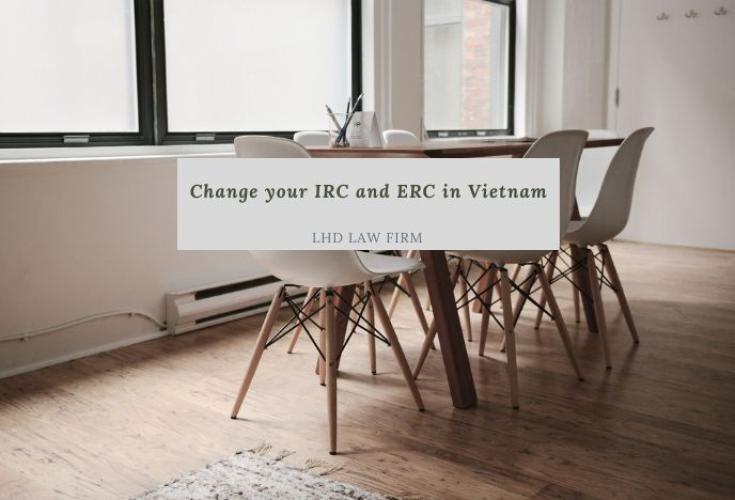
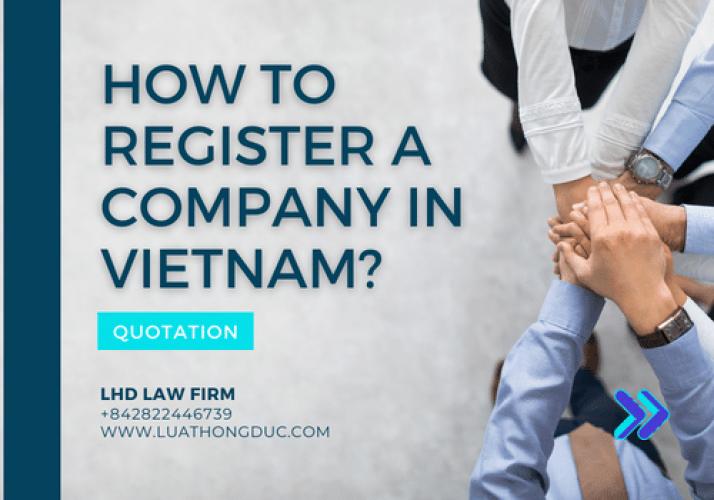


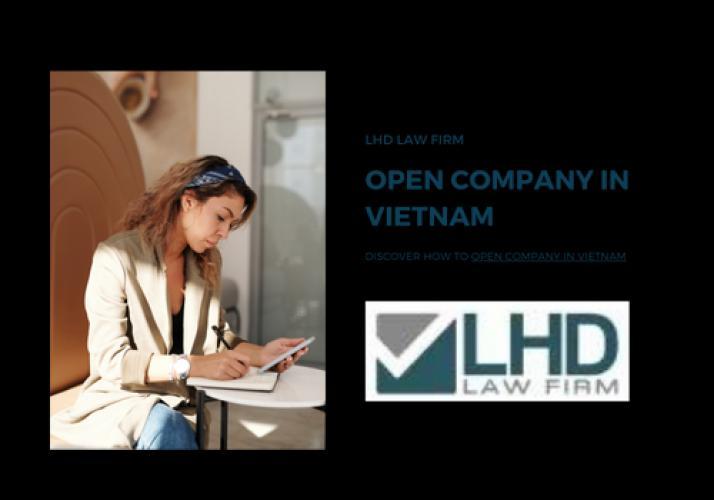


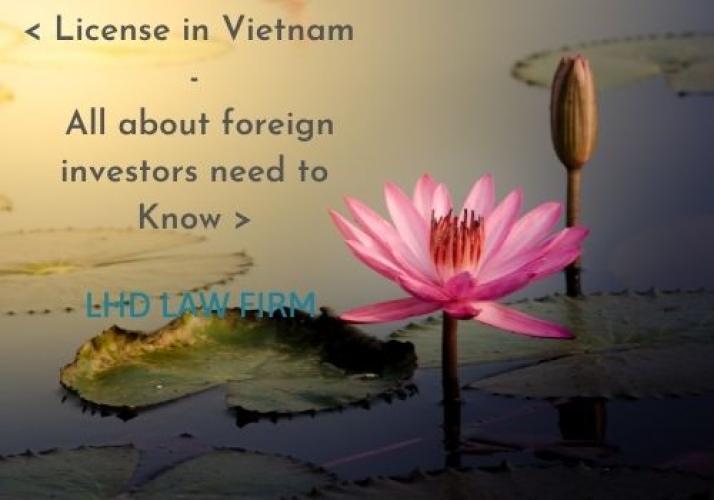

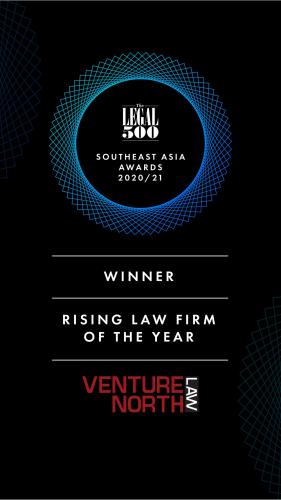
0 comment